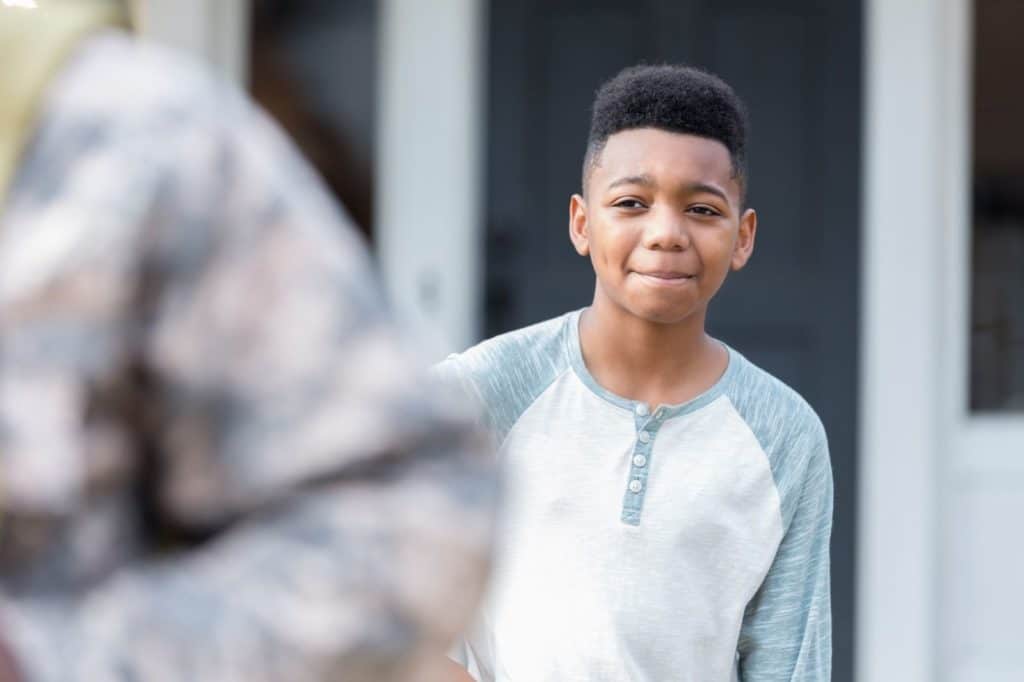There are some common ideas that parents have around deployments and their children. Some believe that the little ones won’t even realize that Mom/Dad left; or since they do not have a concrete concept of time, there isn’t a reason to tell them in advance. For older children and adolescents, some parents may think that the kids just needs to be informed and don’t require any other preparation.
In many of these circumstances, parents are hoping to protect children from feelings of sadness or worry. Often minimization of the impact of deployment comes from a place of care and concern; even from a place of the parent’s own difficulty in processing the upcoming separation from their child. In reality, young people benefit from more rather than less communication and support around this important change.
Deployments come with their phases (pre-deployment, deployment, post-deployment), and this pre-deployment time is filled with an incredible amount of preparation both at work and at home. This preparation is intended to ensure a successful mission, smooth daily operations at home, and that everyone knows their roles. In the spirit of preparation, this is also the best time to begin preparing your child, with the goal that thoughtful advanced planning can better support smooth transitions during the deployment and when the Service Member returns. Here are some suggestions to consider as you plan to tell your child:
Consider the timing
When to tell the child is often one of the most difficult decisions for parents in the preparation process. While you do not want to prolong any potential anxiety, it is important to provide enough time to let the entire family process. Waiting until the night before the deployment or even the week of the deployment is generally not enough time for children. It’s especially harder with very young children, as their sense of time is not fully developed. Start talking about the upcoming changes before children begin to pick up on it on their own and could grow anxious. For children of all ages, consider how your child handles transitions (big and small, exciting and sad), and what your family does to support that child when changes are on the horizon (such as trips, going back to school after summer break, a new babysitter, moving). When you do decide to share the upcoming deployment with your child, make intentional time to tell the news and be available to support your child in his/her reactions and questions.
Share the plan and expectations
Children of all ages need to know who will be taking care of them and that they are loved, supported, and will be protected. For young children, this is done best with concrete messages (ex. “Mommy is going to be gone but Daddy will be here with you every day. Mommy loves you and will miss you so much”) and with physical reassurance through hugs, kisses, and cuddles. Young children need their questions answered but generally do not need as much detail as older children do.
For older children and adolescents, an honest discussion and reassurances are helpful. They can understand greater details and may have more questions. It is important to reassure older children that Mom/Dad is still available for support despite the distance, and share the ways in which the parent plans to still engage with the family. It is also common that during times of deployment, more responsibilities are given to older children in the home. Share these expectations early and work together to make a plan that is age appropriate.
Encourage your children of all ages to ask questions, but stop providing details when they appear satisfied with the answers and explanations. Share how the family plans to stay connected (i.e. Skype/Facetime, letters, messenger apps), but be sure to leave room for flexibility in the new routine as connectivity, time changes, and unpredictable works schedules often present as challenges at some point during the separation.
Provide your child with developmentally appropriate information and vocabulary
Share with your child, even if they are very little, that this is called a deployment. While that word may have no meaning for your 16 month old, it is important to highlight that this is different than what they understand to be “work,” “a trip,” or “vacation.” While your daughter may be a 16 month old now, she will be older with a much richer vocabulary when you return. When a deployment is characterized as “work” to children, you run the risk that a child might become anxious when the homefront parent goes to work.
Begin to provide context to your child for how a deployment is different than what they know your work to be now. Share where you will be going and point it out on a map. Think about examples that you can provide that help illustrate distance, such as, “You know how Grandma lives really far away but she still loves us and calls every weekend?” Explain why you have to be gone, in a way that is developmentally appropriate, not scary, and consistent with your family values around military service. Anchor the time you will be gone to events that your child values if they are not yet old enough to grasp traditional months. For example, you could share that when they finish 1st grade you’ll be home soon or that you’ll be home after Thanksgiving and before Christmas. It can also be helpful to use a visual like a calendar for counting down or a paper chain with a link for each week.
Use the opportunity for a “good” goodbye
A deployment can be viewed as an opportunity for a “good” goodbye. This is a chance when you get some control around how you want to leave, what you want your child to remember, and what you want your child to experience around being loved, missed, and important. In the military, there may be designated ceremonies to mark a time for goodbyes. Consider in advance if you would like your entire family to attend such a ceremony and think about the factors contributing to that choice – time of day for drop off, the amount of time spent there (do you wait until the buses leave or leave after bag drop?), what the family will do after the Service Member has left.
Whether you choose to have your children join for drop off or not, consider beginning the goodbye process before the actual big day. Plan to spend some special time with each child before you leave that focuses on your bond and interests that you share. Remind your child that you love him/her and you are not leaving because of anything that they did, or that you want to be away from them. At the time of the departure, say goodbye to each individual person, and be prepared to support your child in their emotional reactions, whether they are sad and tearful or angry. Know that it is ok to also share your emotions with them. A response to a tearful child may be, “I am sad too and that’s ok.” A response to an angry child might sound like, “I can understand why you are angry and upset, but remember that I love you no matter what.”
There is a story that develops for the family around each deployment. The story of this deployment begins before the Service Member parent leaves and provides you with the rich and unique opportunity to help shape this narrative. When preparing your child for the deployment, take some time to consider how you want them to remember this time, what would make them feel loved, and what would set your family up for success in the coming days, weeks, and months of this time apart. Take a step back to reflect on how you would want to find out about this big transition if you were in their shoes and use that reflection to help guide the time you have together before the big drop off or departure.
Goodbyes aren’t enjoyable for you or your child, but by providing time to process and transition, sharing the important details, and marking the departure with love, there will be less anxiety and confusion for everyone involved.










